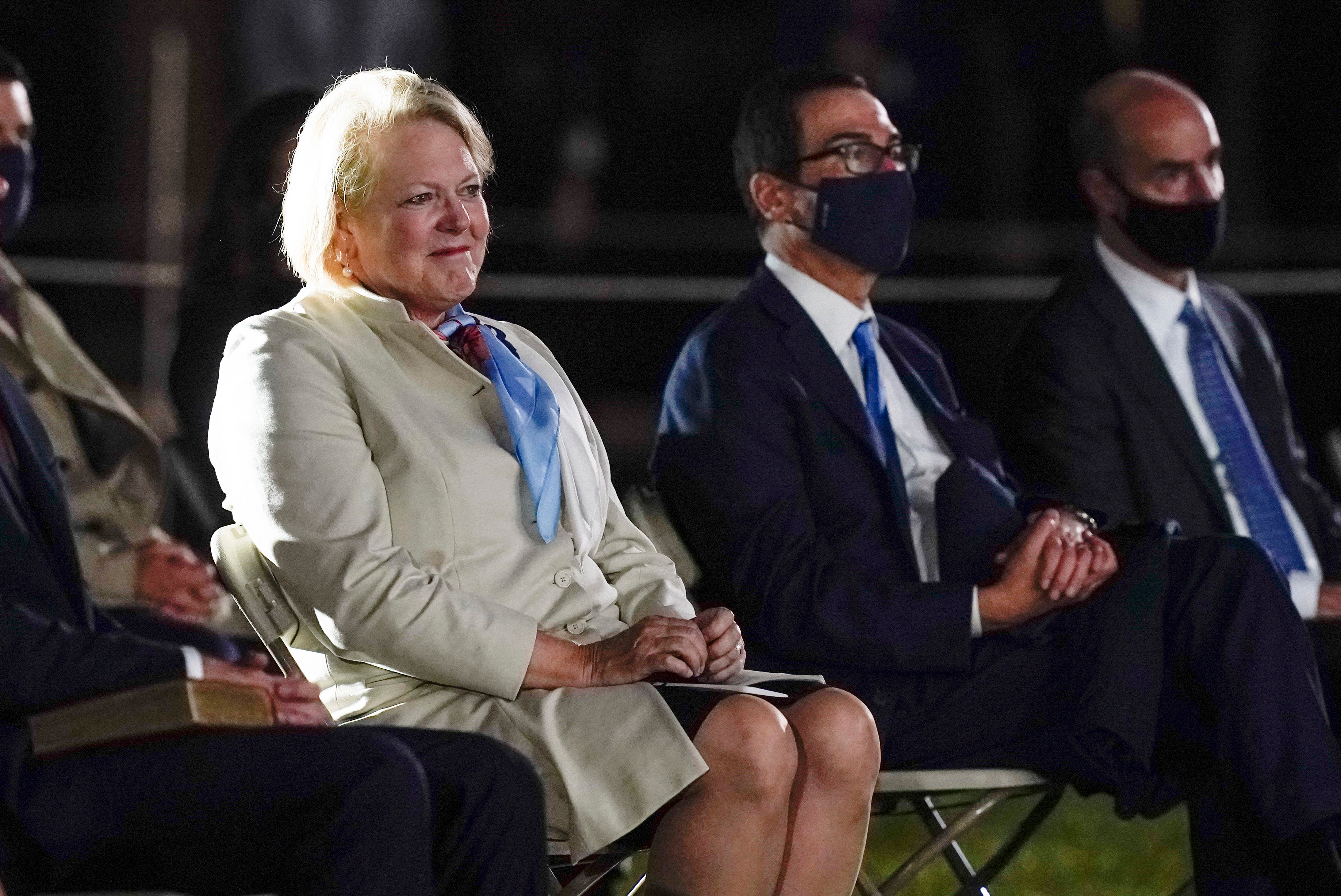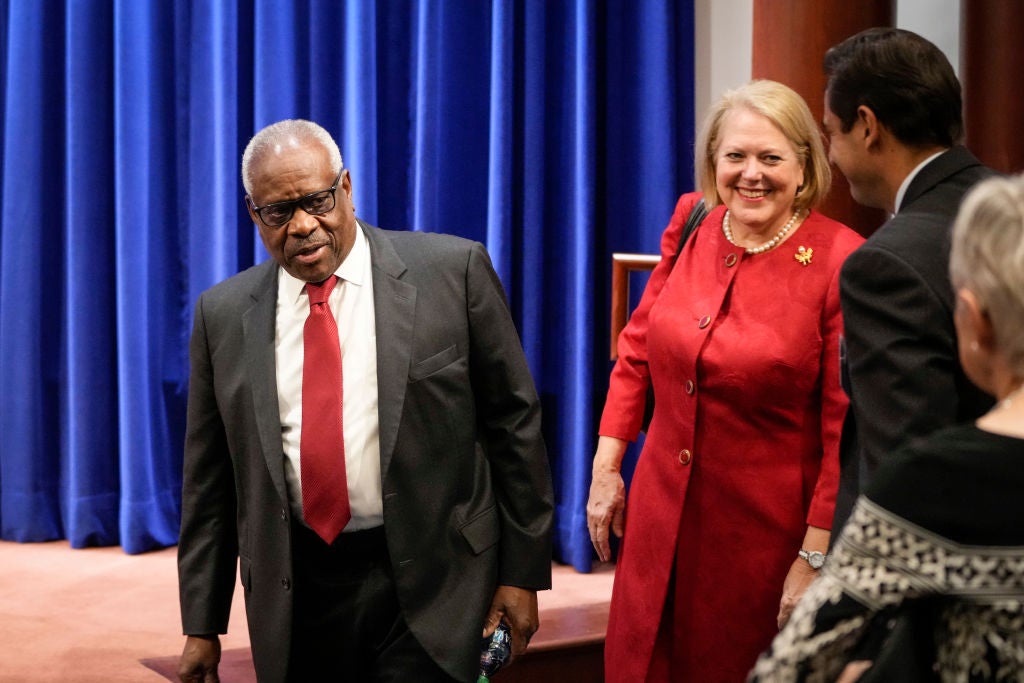Three key questions Ginni Thomas must answer in January 6 panel interview
Members of the January 6 committee announced this week that Virginia ‘Ginni’ Thomas, the wife of Supreme Court Justice Clarence Thomas, had agreed to testify under oath.
The development has been expected and followed the committee’s formal request for her testimony via letter; she was not subpoenaed, though lawmakers reserved the right to do so.
Nevertheless, the testimony of a Supreme Court justice’s spouse to a congressional committee is wholly unprecedented. But so was Ginni Thomas’s role in the months-long plot by Donald Trump and his supporters to overturn the lawful 2020 election results, as well as the attack on Congress itself.
Ms Thomas’s role in the plot has generated more controversy than the participation of most others involved due to her husband’s job on the bench of the nation’s highest court, which last year found itself (including Mr Thomas) ruling on matters related to January 6 and the efforts by Congress to investigate the siege of the Capitol. Mr Thomas, at the time, was the lone dissenting vote against providing presidential records to the committee, a vote that has only drawn more scrutiny and criticism with time.
As such, there are several questions that Ms Thomas is in a unique position to answer, both regarding her own activities as well as those of White House staff in the weeks leading up to the attack as well as the day of January 6 itself.
How much did Clarence Thomas know, and was he involved?
This is by far the most pressing issue that lawmakers will seek to address. The idea that a sitting Supreme Court justice sat by as his wife attempted to overturn the results of the election and pressured lawmakers around the country to join a scheme that many have flat-out declared was illegal would give anyone pause by itself.
But that’s hardly the only side of this question.
Was Mr Thomas involved, even tangentially through occaisional discussions, with his wife’s efforts? Did she seek to use her very personal connection to him as a means to convince lawmakers that their efforts would be upheld as lawful by the Supreme Court? Did Mr Thomas know anything about his wife’s activities before ruling on a case (or cases) related to White House communications on January 6?

These are all monumentally important questions that very few if any people, save for Ms Thomas and her husband, will know the answers to. But they speak to serious issues that affect not only the committee’s investigation but the legitimacy of the Supreme Court itself, which according to polling is being questioned by a historic share of Americans.
Was she in contact with the White House? If so, when?
One of the main questions the committee has continued to pursue over the past several months has been the connections between the White House, the Trump campaign and independent pro-Trump groups whose followers rallied outside the White House and elsewhere in Washington DC on January 6.
The range of those groups amassing in DC cannot be overstated. Some were closely aligned with the Trump campaign or Republican National Committee. Others, like the Oathkeepers, Proud Boys and Three Percenters, fall into the category of right-wing militia groups whose members tend to organise independently. But even that assumption is in question, as lawmakers have suggested that there may be evidence proving communication between White House or Trump campaign staffers and those right-wing militia groups, who are known to be connected to allies of Mr Trump including Roger Stone.

Ginni Thomas is known to have been in downtown Washington DC during January 6 itself. She has said that she never attempted to enter the Capitol, and went home early feeling unwell; she has not been accused or charged with any crimes related to the attack. But it remains in question whether she was involved in any of the organising that led to thousands of Trump supporters descending upon the Capitol that day, as well as whether she had the White House’s backing to do so.
How many states did Ginni Thomas’s effort encompass?
We already know, through media reports, that Ginni Thomas was actively involved in attempts to overturn election results in two states: Arizona and Wisconsin. What we don’t know is whether those were the only ones. Was she active in Michigan, where a voting machine was recently found for sale on eBay? What about Georgia, where prosecutors in Fulton County are actively pursuing a criminal investigation that has already enveloped top-ranking members of Donald Trump’s legal team?
Understanding the scope of Ms Thomas’s efforts will be important as lawmakers determine whether she was coordinating with the Trump campaign (and by extension, the White House) and seek to understand the methods that she employed in her attempts to persuade state lawmakers to interfere in the election process.
Answers to all of these questions and more are set to be unveiled by the committee in the coming weeks as lawmakers prepare for a final, public hearing to lay out their findings next week.
The meeting is set to be held in the early afternoon, in contrast to the two prime-time hearings previously held by the panel, and is set to include "significant witness testimony" that has yet to be released, according to chairman Bennie Thompson.



Join our commenting forum
Join thought-provoking conversations, follow other Independent readers and see their replies
0Comments